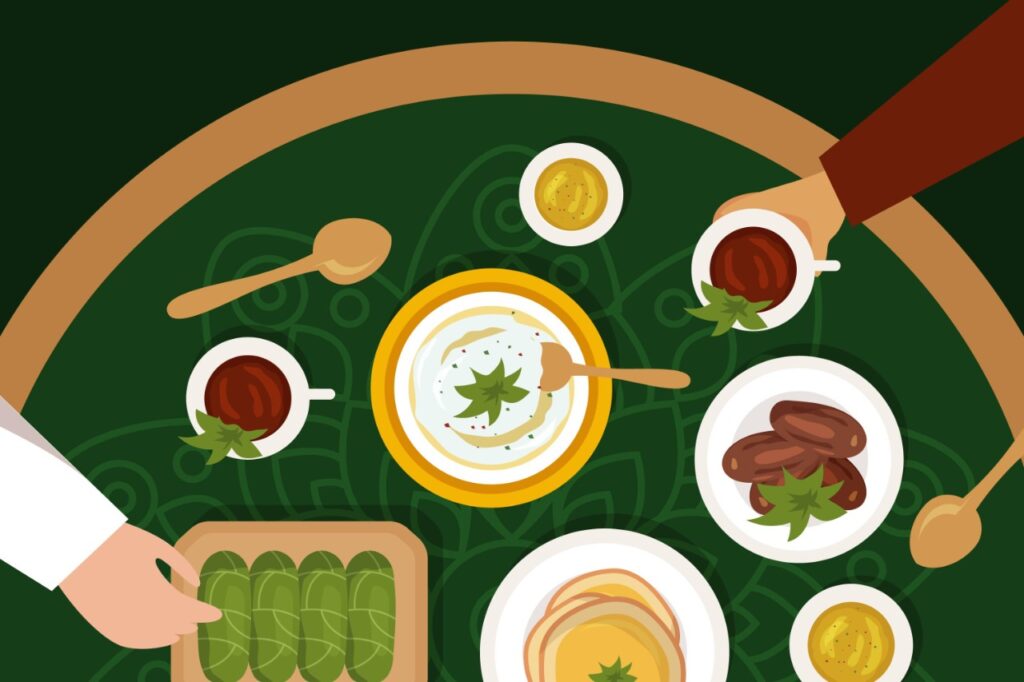

Rajab is the seventh Hijri month that follows the lunar calendar, and it’s also one of the four sacred months- along with Muharram, dhul-hijjah, and dhul-qi’dah. (those four months are called scared, in which Allah forbids fighting.
Ibn Abbas said: They are sacred because Allah magnifies the degree of sins and good deeds in them. So, he said don’t commit sins in that month and do harm to yourselves.
Another reason for their sacredness is battles are prohibited in them, So people can perform Hajj and Umrah safely.
They perform Hajj In Dhul-Hajj, trek to Hajj In Dhu’l-Qa’dah, return back home in Muharram and perform ‘Umrah, the lesser pilgrimage in Rajab.
In this article, you’ll know the great virtues of this month in Islam and what to do to be devout and increase your good deeds in this blessed month.

Rajab (رجب) is an Arabic word that means to honor, and it’s called that because Arabic people before Islam glorified this month by prohibiting battles and bloodshedding. And such glorification continues after Islam.
Due to such dominant silence, Arab people called Rajab ” the Deafen month” ( الشهر الأصم in Arabic). It was hard to hear the horses galloping, swords rattling, or tribes rallying against each other or calling for help throughout this month.
Ragab is also called by other names such as الأصبّ (pouring) because the divine mercy of Allah is poured down on people in this month.
Rajab is sacred for Arabs because they used to perform the Umrah during this month.
Dr. Jawad Ali, an Iraqi historian, points out in his book “The Detailed History of the Arabs Before Islam” that some Arab tribes used to perform Umrah this month. Of course, their number was not as large as in the greater Hajj season.
However, to ensure their safety, they signed covenants with the ruling tribe of Mecca so that No one could attack the pilgrims or merchants passing through their road to Makkah.
Another reason for adding Rajab to the “sacred months: is because some tribes used to venerate it. So, They’d offer sacrifices called “Atira” and “Al-Rajabia to their idols to appease them. Islam abolished this pre-Islamic custom. But that veneration is maintained for Rajab as it’s one of the sacred months for Allah.
Read also: What is the Meaning of Hamd (الْحَمْدُ لِلَّهِ) and praise Allah?

The month of Rajab is one of the lunar months whose number of days is fixed, either twenty-nine or thirty days. It can’t be more or less than that.
Ibn ‘Umar reported the Messenger of Allah as saying, “We are an unlettered people who can neither write nor count. The month is thus and thus and thus,” drawing in his thumb when he said it the third time.* Then he said, “The month is thus and thus and thus,” meaning a complete thirty days. He meant alternately twenty-nine and thirty.
*Spreading out the ten fingers the first two times and nine the third time.
The month of Rajab has special significance and sanctity for the Muslims because it is one of the sacred months in which God forbids a person to do harm to himself by falling into disobedience. As he said in surah al Tawbah (the repentance), verse 36
The number of months in the sight of Allah is twelve (in a year)- so ordained by Him the day He created the heavens and the earth; of them, four are sacred: that is the straight usage. So wrong not yourselves therein, and fight the Pagans as they fight you. But know that Allah is with those who restrain themselves.
So, The main virtue of Rajab is due to its sanctity as one of the sacred months, and the miraculous event of the Al-Isra and Al-Miraj is assumed to have occurred in the month of Rajab. However, there are no specific rituals like fasting or prayer held in it Because the role model for Muslims, the Messenger – may God’s prayers and peace be upon him – did not do that, nor did his companions or those who followed them.

No authentic hadith has been proven specifically about fasting in this month. Also, the Islamic Sharia did not urge Muslims to assign a specific day in it for fasting. There is only one weak hadith in the Prophetic Sunnah concerning the fasting of the sacred months, including Rajab.
Sheikh Al-Islam Ibn Taymiyyah said: All of the hadiths about the virtue of fasting in Rajab are only weak or fabricated. Rather, most of these hadiths are false and not among the weak hadiths narrated about the virtues of deeds.
So, we can conclude that many hadiths confirm the virtues of fasting in Rajab aren’t attributed to the prophet Mohammed. However, people still can fast as they do in the other months to draw closer to Allah, Such as fasting on the white days, Mondays and Thursdays, and other days that have been reported from the Messenger of God.

There is not many hadiths about Rajab, but most of them show its sancitity.
Anas said that when Rajab came, God’s Messenger said
“O God, bless us in Rajab and Sha’ban and bring us to Ramadan.” He also said, “Thursday night is a very bright night, and Friday is a shining day.”
Another hadith Narrated by Abu Bakra:
The Prophet (ﷺ) said.
(The division of time had turned to its original form, which was current when Allah created the Heavens and the Earths. The year is of twelve months, out of which four are sacred: Three are in succession Dhul-Qa’ da, Dhul-Hajj, and Muharram, and (the fourth is) Rajab of (the tribe of) Mudar, which comes between Jumadi-ath-Thaniyah and Sha ban.
Also, among the practices of the idolatrous pre-Islamic Arabs is sacrificing something called fara and atira. While the fara’ sacrifice was abolished in Islam, it is said that the sacrifice of a sheep or goat in Rajab, known as the ‘atira, was continued in the early days of Islam and then abolished.
Abu Huraira reported the Prophet saying, “There is no fara’ and no ‘atira.” He said that the fara’ was the first animal born to them which they sacrificed to their idols, and the ‘atira was observed in Rajab.*
Since Allah showers his mercy upon his believers in this month. we collected a list of good deeds you can do to be closer to Allah.
There is nothing in the Sahih of the Prophet; may God’s prayers and peace be upon him regarding the virtues of the month of Rajab and its desired actions. However, Muslims need to renew their repentance and seek forgiveness from Allah each month, and Allah opens his door of repentance to his servants.
Abu Musa reported God’s messenger as saying, “God stretches out His hand at night that those who have done evil during the day may repent and stretches out His hand in the day-time that those who have done evil during the night may repent, until [the time when] the sun rises in the west.”
Here is a list of Istaghfar dua you can recite during the month.

Congratulating members of your family or friends is one of the good things that remind you of obedience to the Most Merciful, the Highest.
Though it’s not a sunnah of the prophet Mohammed, many Muslim scholars accept it. Sending congratulatory messages builds up good relations between Muslims in the community and solidifies their affection toward each other.
This month is an opportunity for any Muslim to increase his prayer, dua, charity, and fasting, seeking Allah’s paradise.
It’s mustahabb for a Muslim to Fast one, two, three, or four days every month. This is according to the hadith of Abdullah ibn Umar – may God be pleased with him – which was narrated from the Prophet – may God’s prayers and peace be upon him.
“”Fast one day, and you will have the reward of what is left.” He said: “I can do more than that.” He (ﷺ) said: “Fast two days, and you will have the reward of what is left.” He said: “I can do more than that.” He (ﷺ) said: “Fast three days, and you will have the reward of what is left.” He said: “I can do more than that.” He (ﷺ) said: “Fast four days, and you will have the reward of what is left.” He said: “I can do more than that.”
He (ﷺ) said: “Observe the best kind of fasting before Allah, the fast of Dawud, peace be upon him; he used to fast one day and break his fast for one day.”
No hadith mentions that performing Umrah in Rajab is more rewarding than doing it in other months.
Even A hadith Narrated by Mujahid nullifies that prophet Mohammed performed Umrah in Rajab.
`Urwa and I entered the Mosque and found `Abdullah bin `Umar sitting beside the dwelling place of `Aisha. `Urwa asked (Ibn `Umar), “How many `Umrah did the Prophet (ﷺ) perform?
” Ibn `Umar replied, “Four, one of which was in Rajab.” Then we heard `Aisha brushing her teeth, whereupon `Urwa said, “O mother of the believers! Don’t you hear what Abu `Abdur-Rahman is saying? He is saying that the Prophet performed four `Umra, one of which was in Rajab.” `Aisha said, “The Prophet (ﷺ) did not perform any `Umra, but he (i.e. Ibn `Umar) witnessed it. And he (the Prophet (ﷺ) ) never did any `Umra in (the month of) Rajab.”
Rajab is 7th in the Islamic month, with specific importance to Muslims. It’s one of the four sacred months, and it’s assumed that the miraculous night journey of Israa occurred at it.
This article taught you about Rajab, its meaning, and the good deeds you can do to be closer to Allah this month.
Hopefully, you find this article helpful for you…Have a blessed day!

